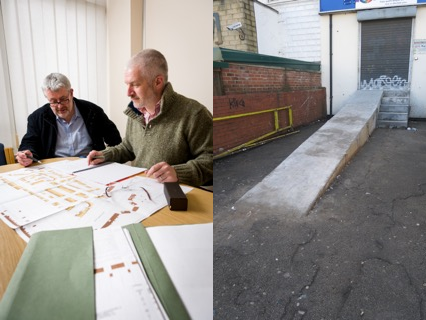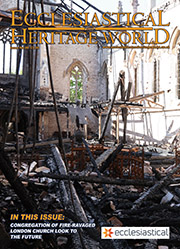Disabled Access in church and listed building restoration. The cost of defective design.
 Good design is important regardless of the property, the product or the people using it. The additional factor when designing to accommodate access for disabled people is that you may face the costs of fixing any errors – and of any dealing with any discrimination claims which may result.
Good design is important regardless of the property, the product or the people using it. The additional factor when designing to accommodate access for disabled people is that you may face the costs of fixing any errors – and of any dealing with any discrimination claims which may result.
That can leave you facing a triple whammy of paying for improved design, loss of business and customer compensation, and it underlines the importance of getting the design right at the outset.
A new construction project or major renovation can involve an army of experts all working towards the same aim but not necessarily aware of the fine detail which can make or break the best-laid plans.
You might have a lead architect, someone looking after construction design and management, a fire engineer, a mechanical and electrical expert, a landscape architect. They are all specialists in their respective disciplines but they may not necessarily anticipate the accessibility impact of their individual contributions on the wider project.
The general principle of a ten-fold increase in the cost of an error for each stage of the process is particularly applicable to building design.
For every £1 you might spend remedying a problem at the concept and preparation phase you can expect to spend £10 if the problem is not resolved by the time you get to scoping a project, and £100 at the planning and pre-construction stage.
Add another zero if the problem lingers to the point of application and construction, and be prepared for that initial £1 to climb to £10,000 if the failure to act early leaves you making alterations once the property is occupied and in use.
By appointing an access consultant to the team you can ensure you get things right first time, avoiding the delays and cost to a project that result from having to revise the work of one specialist and then make sure it fits with the plans of all the others. The savings in time and money are such that typically the investment will pay for itself.
At About Access, we conduct appraisals to ensure that inclusive design is achieved throughout the construction process.
We study accessibility provision from the earliest stage, looking at the plans and giving our advice at a point where corrections and improvements can be easily accommodated.
We use our experience and understanding to make recommendations that will assist a design team in incorporating features to improve access, and we also help them save time and money by avoiding costly corrections once construction is under way – or even complete!
It could be as simple as suggesting the provision of a meeting room on the ground floor for visitors to a building, but even that can be a significant saving in an environment where a little knowledge can be dangerous and expensive.
In terms of incentives for good practice there is more to this than staying within the law and avoiding the discrimination against disabled people which could leave your business vulnerable to a claim.
Think also about the cost of the business lost when a disabled person and the other members of their party decide to shop, eat or stay elsewhere because your facilities don’t extend the welcome and level of care which they are used to.
The Department for Work and Pensions refers to the “purple pound” to indicate the spending power of a disabled person and the other people in their household. Citing the Family Resources Survey of 2012–13, it calculates that the 12.2-million households in the UK which include a disabled person have a combined income – after housing costs – of £212-billion.
We can help your business take an inclusive approach to what is potentially a huge market. Our Managing Director Ian Streets is a member of the National Register of Access Consultants, the Access Association and Network Rail’s Built Environment Access Panel (BEAP). He has also worked with BSI Standards, the UK’s national standards body, to advise on appropriate designs for buildings and their surrounding areas.
In the coming months we will look at some specific issues and examples around access for disabled people. If at any point you want to know more, or you have a specific question or concern, please contact us at This email address is being protected from spambots. You need JavaScript enabled to view it..
















